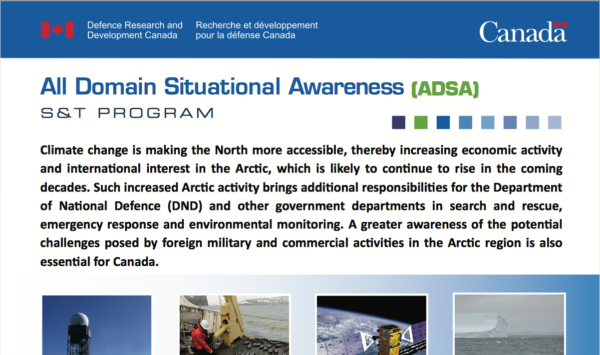UVic’s Department of Geography has the opportunity to propose a research project that could earn it $3 million in funding from the Canadian military through the Department of National Defence (DND)’s All Domain Situational Awareness Program.
This DND program is in response to climate change and its effects on northern borders, which has led to increasing economic interest in the region. The program is aimed to collect data so that the military can better defend the northern border now that the area is more accessible.
“Through an investment of $133M over five years in All Domain Situational Awareness (ADSA) [science and technology], DND will conduct research and analysis to support the development for enhanced domain awareness of air, maritime surface and sub-surface approaches to Canada, and in particular those in the Arctic,” reads the project outline posted in an online PDF.

While the project outlined would provide a financial boost to the Geography department, some ethical concerns have been raised. Screenshot of Defence Research and Development Canada PDF
Of the $133 million available, UVic’s geography department has the opportunity to ask for about $3 million, though the decision to make this proposal, and the decision to accept it, won’t come until later this year.
“This is just an exploratory stage and we are not even at the proposal stage . . . we just have had one brief discussion to date without any concrete outcomes,” said Johan Feddema, professor and Geography department chair, via email.
If the proposal is accepted, UVic geographers would participate in a community-based observation network which would monitor climate change and the increases in shipping trafficking. This information would then be given to the DND for the ADSA Program, though how exactly the military would be using the data isn’t explicitly known at this stage.
Because of this, the ethical implications of the research could outweigh the substantial funding.
“Three million dollars is obviously a lot of money that institutions don’t get thrown at them that often, if ever,” said Paige Bennett, a Geography honours student. “So I understand the desire to go for it but I think it goes beyond just getting funding when it’s coming from the Canadian military.”
Bennett hopes that, going forward, students will be involved in deciding where they think their departments should get their funding from.
“There is no student consultation going on, and I think that if we’re going to be graduating from an institution, and specifically a department that’s getting three million dollars in funding from the Canadian military, there should be an open discourse among students about the ethical and moral implications of that,” said Bennett.
“I think it should be a right of a student to know what their department is doing. There’s implications for our livelihoods and our careers too.”
Ethical issues over collaborations with the military have been ongoing in geography circles, and there have even been petitions online that argue geographers should not accept funding from any military bodies, period.
One petition by the Network of Concerned Geographers on actionnetwork.org outlines the many issues with geographers working with military bodies. These include the possibility of “shifting the centre of gravity in the discipline away from forms of critical scholarship towards those with potential military applications,” as well as potential safety and ethical concerns of geographers working on countries engaged in war.
“The involvement of the military and intelligence agents in academic life has a chilling effect upon independent thinking (particularly of the policies of the state and military),” reads the petition.
However, this project has only been in preliminary discussions within the department, and there is a ways to go before they decide whether to pursue the proposal.






